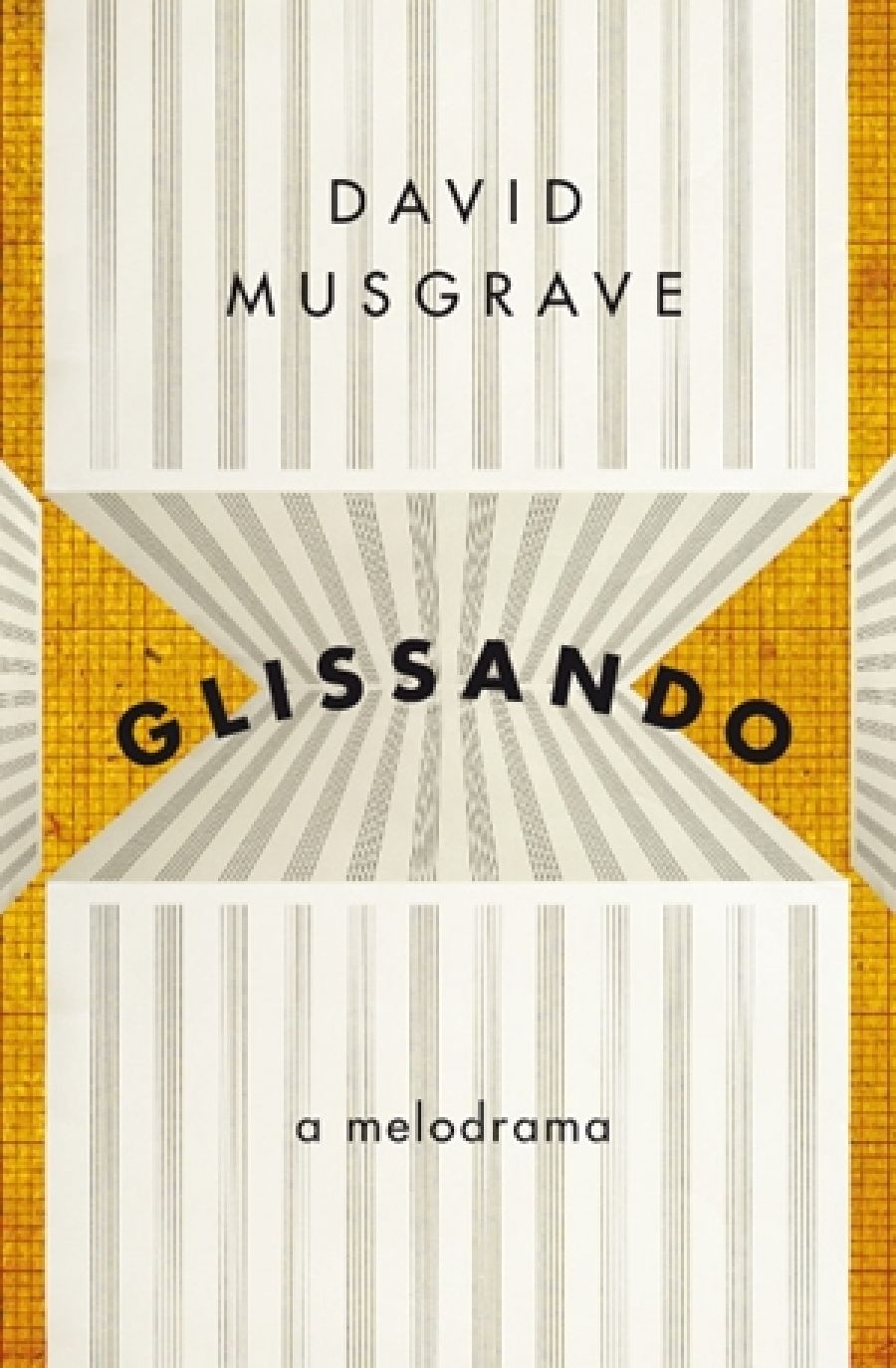
- Free Article: No
- Contents Category: Fiction
- Review Article: Yes
- Article Title: Parodic feast
- Online Only: No
- Custom Highlight Text:
Patrick White got it wrong. European Australians have never been driven to find spiritual meaning through physical deprivation in the deserts of the interior. Their passion has been for housing and construction, matched by their devoted gourmandising. White declared that in Voss he was trying to teach a nation of timid city dwellers that there was more to life than material comfort and ‘cake and steak’. He did take himself rather seriously.
- Book 1 Title: Glissando
- Book 1 Subtitle: A melodrama
- Book 1 Biblio: Sleepers Publishing, $27.95 pb, 392 pp
Archie Fliess and his story belong to the extravagant improvisatory tradition of Peter Carey’s Illywhacker (1985), Murray Bail’s Eucalyptus (1998) and Steve Toltz’s A Fraction of the Whole (2008) – and, most clearly, Thomas Love Peacock’s fictional gatherings of ludicrous people in nonsensical settings. It is an alternative to the earnest attitudes to history and human vanity that we like to associate with high art. Archie is hardly even an actor in his own story; abandoned with his half-brother by his theatrical parents, he is content to record the absurdities of his family and his guardian, Madame Octave, and her associates. Madame belongs to the Pataphysical Variety Theatre, ‘an experimental theatre, which means they’ve never quite got it right’. Musgrave has fun inventing their performances: subversions of drawing-room melodrama, with gruesome images of maimed returned soldiers, absurd medleys of Shakespeare and buttock puppetry. Their great rival is the established National Theatre in Sydney, with its commitment to forms of realism and elevation of the Critic as the most significant participant. Theatre wars have raged between the two institutions. The insubstantial plot of this novel relies on Archie’s innocent involvement in the pair’s jealousies.
Musgrave, of course, is declaring his allegiance to the Pataphysical approach to art, with its bursts of parody and disruption, rather than to the dutifully mimetic. He is fond of Criticism, though, and allows the Chief Critic of the National Theatre, the enormous Basil Pilbeam, to sit at table and perorate on its importance: ‘All great critics have in them no mean portion of wit. And with that comes the ability to smile seriously.’ Pilbeam reminds me of Ben Jonson’s Sir Epicure Mammon from The Alchemist, who glories in the exotic and exceptional possibilities of food. Musgrave invents a feast for his characters that is almost worthy of Heston Blumenthal.
Can there be Pure Criticism, ‘unfettered by the irrelevant concerns of a subject’? Perhaps the desire for it might lead to fictions like this one, tangential to what we know of the phenomenal world. Certainly, a passing acquaintance with Voss, and a taste for Swift and Peacock, will increase the reader’s pleasure in this novel. It is for readers whose critical impulse is as strong as their need to surrender to fiction. It will appeal to those who like Jonson’s plays as much as Shakespeare’s.
Such a playful, mocking approach to the novel requires constant inventiveness and literary skill to carry us through its randomness. Musgrave demonstrates plenty of wit and originality with his sketches of eccentric behaviour in a rather innocent rural Australia. His pastiches of the journal entries in Voss, particularly Le Mesurier’s prose poems, are brilliant. Much of the humour comes from the mismatch between the educated formality of Archie’s voice and the silliness of what it tells us. Basil Pilbeam, too, adopts the imperious tone of the highly educated as he speculates about nonsense. Well, mostly nonsense. This could become monotonous if not for the pace of the novel, and its excursions into literary parody.
Yet I still kept wondering about the source of the money and the food supply; and wondering what role Reggie was playing or how Archie claimed to exist. There is a history of sorts occurring in the background: the murder of one of Archie’s Aboriginal friends, World War I, the Spanish Civil War, though Archie manages to remain a recluse right up to the 1960s, with no direct contact with the history of his own time. This allows him to see the ‘majestic idiocy’ of the Sydney Opera House as the triumph of the architectural dreams of the National Theatre.
The novel is subtitled ‘a melodrama’, another little puzzle for readers. We may need to take it in the Pataphysical sense, as a mere mockery of the form. That is the delight of this novel: it refuses to take itself or artistic culture seriously, though it depends entirely on the author’s, and his readers’, devotion to them.


Comments powered by CComment